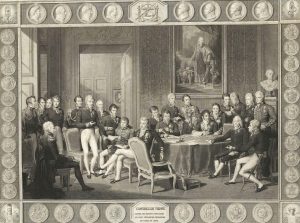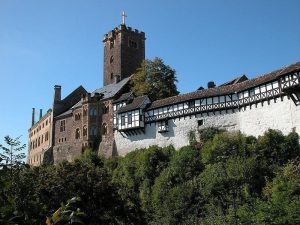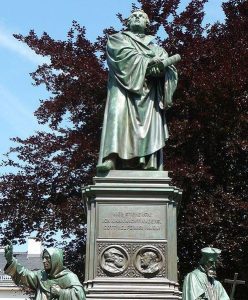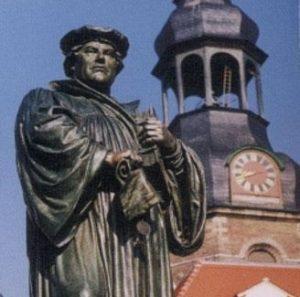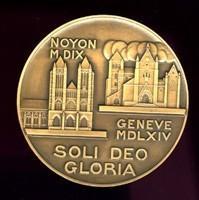Jubilees from 1817 to 1867
1817: the political context was one of a “reaction” against the Vienna Congress and in favour of more democratic ideas.
18 – 19 October: the Wartburgerfest ( Festival of Wartburg): about 500 students from twelve universities gathered together at the Wartburg Castle to celebrate the victory over Napoleon as well as the Reformation Jubilee; they also declared their support for national unity and civil democratic rights. Luther took on a new identity as a German patriot because he was the founder of their national culture, he had overcome the Pope in Rome and had given back to the Germans the freedom they had lost.
In Tübingen on the 31st October, professors, students as well as representatives of the citizens and corporations all celebrated both the Reformation and the Leipzig victory at a grand jubilee with a parade by torchlight through the city.
The attitude to Luther varied in the speeches and sermons of the 1817 jubilee. For the “Aufklärer” (philosophers of the Enlightenment) Luther was considered to be the founder of German language and culture; he was also seen as a defender of the freedom of conscience.
The Prussian Government of Frederick William the III saw Luther as the father of the Reformation and drew attention to the fact that Lutheran and Reformed Protestants were now united.
Orthodox Lutherans thought that Luther was above all a theologian who taught the basic tenets of true faith.
For the Pietists he was the first to introduce the widespread reading of the Bible and the conversion of non-Christians.
Everyone insisted on Luther’s achievements and the lasting consequences of the Reformation, but no-one was particularly interested in what Luther did on the 31st October 1517.
1867, the 350th anniversary of 1517: this jubilee was greatly influenced by Protestant Prussia’s military triumph over Catholic Austria in their attempt to appropriate for themselves what was left of the “Holy Roman German Empire”.
Luther’s statue is put up in Worms
In Worms on the 25th June 1868, Luther’s statue (Das Wormser Lutherdenkmal – the Luther memorial) by Ernest Rietschels (1856-1868) was unveiled amid general festivities – it was one of the first open air celebrations to be held. There were 100 000 visitors, due to modern methods of transport (steamers and trains). Rather than being a religious festival it was more a celebration of free thinkers, according to the Abbot Marbach, who heard someone shout “Long live the King of Prussia Emperor of Germany!”
The 1883 Jubilee was the 4th centenary of Luther’s birth
The political context in the German Empire was focused on Protestant Germany’s triumph in 1870 – 1871 over Catholic France and the creation of the German Empire; it also drew attention to the Kulturkampf (fight against the Catholic Church), accentuated by the proclamation of the Pope’s infallibility (1870) and the growing power of the Zentrum (the Catholic party) in Parliament. Luther took on a completely German identity and the Reformation was seen as a German rebellion against the clerical power of Rome.
In Wittenberg, Erfurt, Eisleben and Eisenach festivals were held, museums and memorials came into being, oak trees were planted and The Reformation Archives were set up.
In the United States the Luther Jubilee attracted a certain amount of attention, even outside Lutheran circles. The reformer was considered to be one of the four founders of the New World, together with Christopher Columbus, Gutenberg and Calvin.

